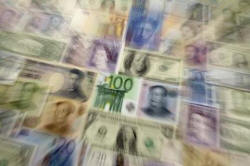|
 Euro
steadies after dip on Portuguese bank nerves Euro
steadies after dip on Portuguese bank nerves
 Send a link to a friend
Send a link to a friend
[July 11, 2014] By
Patrick Graham
LONDON (Reuters) - Major currency markets
were steady in Europe on Friday, having ridden out a day
of ructions on European stock markets with only minimal
moves on the euro and yen.
|
|
 Strategists were skeptical of whether concerns about Portuguese bank
BES would prove the trigger for an immediate change in market tone
away from the steady, low volatility plays of the past six months. Strategists were skeptical of whether concerns about Portuguese bank
BES would prove the trigger for an immediate change in market tone
away from the steady, low volatility plays of the past six months.
But Thursday's 4 percent slide in Lisbon shares and the losses it
brought with it for other European banks supported those who have
been warning for the past month or so that there is a bubble in
stock and some bond prices that may soon burst.
The main currency candidate to suffer from any such move would be
the euro, which has benefited from a flood of money into markets in
the euro zone's indebted southern half over the past year.
"I don't think you can look at BES and say it's the start of
something, but it is a symptom of what seems to be happening," said
Simon Derrick, head of global FX strategy with Bank of New York
Mellon in London.

"All of the reasons for owning the euro over the past year are
steadily being taken away. That doesn't mean euro-dollar is going to
shift straight away but it does look increasingly likely that a move
is in the pipeline."
The euro fell half a cent against the dollar on Thursday - a very
ordinary daily move. It was flat at $1.3607 in early European trade
on Friday.
The yen was poised to end the week higher on Friday, having jumped
to a five-month peak against the euro overnight on the sell-off in
global equities.
The euro last traded at 137.79 yen, having fallen as far as 137.50,
its lowest since early February.
[to top of second column] |

The dollar was at 101.35 yen after touching a seven-week low of
101.06. The Aussie fetched 95.09 yen, following a dip to a five-week
low of 94.66.
"Treasury yields and U.S. and Japanese monetary policies remain
drivers of the yen," said Masashi Murata, senior currency strategist
at Brown Brothers Harriman in Tokyo.
"The Portuguese banking woes did strengthen the yen, but I see this
more as a result of the dollar being sold as Treasury yields fell."
The Treasury 10-year note yield briefly fell to a five-week low of
2.494 percent on Thursday before pulling back above 2.500 percent.
(Additional reporting by Ian Chua and Shinichi Saoshiro, editing by
John Stonestreet)
[© 2014 Thomson Reuters. All rights
reserved.] Copyright
2014 Reuters. All rights reserved. This material may not be
published, broadcast, rewritten or redistributed.
 |